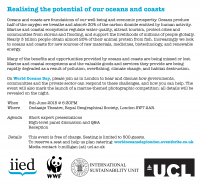IV UCL-KCL Postgraduate Environmental Law Symposium
By Maria Lee, on 21 September 2015
After three highly successful events, the fourth Postgraduate Environmental Law Symposium jointly organised by University College London (UCL) Faculty of Laws and King’s College London (KCL) Dickson Poon School of Law will be held on 25 February 2016 at King’s College London.
European Environmental Law Forum
By Richard B Macrory, on 7 September 2015
Professor Richard Macrory was a key note speaker at the 2015 European Environmental Law Forum conference held in Aix en Provence.
 Almost 150 people attended the meeting held 2-4 September at the Faculty of Law and Political Science, Aix-Marseille University, with workshops including presentations from many PhD students across Europe.
Almost 150 people attended the meeting held 2-4 September at the Faculty of Law and Political Science, Aix-Marseille University, with workshops including presentations from many PhD students across Europe.
The theme of this year’s conference was ‘The Effectiveness of Environmental Law” and Professor Macrory addressed the final plenary session on the challenges of designing effective sanctions at both national and European Union level.
New Centre for Law and the Environment Annual Lecture Series launched
By Chiara Armeni, on 3 August 2015
First Annual Lecture
Environmental Law in the Glasshouse:
A Decade of the Environmental Information Regulations 2004 and What It Tells Us About Environmental Law
Professor Liz Fisher, University of Oxford, Corpus Christi College
Tuesday 20 October 2015, 17:00 – 18:00 (followed by drinks reception)
at UCL Marquee (Main Quad), Gower Street, London WC1E 6BT
The UCL Centre for Law and the Environment Annual Lecture Series is being launched in 2015 as a platform for the development and showcasing of contemporary environmental law scholarship. The Lectures are delivered on an annual basis and cover a wide range of environmental law scholarship and methodological approaches to law.
About this talk
The Environmental Information Regulations 2004 (EIR), as with other information rights legislation, has now been fully in force for over a decade. The starting assumption for these different regimes is that they are straightforward mechanisms that balance a general right of disclosure against limited reasons for non-disclosure. The end result is presumed to be greater clarity about environmental governance. But a decade’s worth of Information Commissioner decision notices, and tribunal and court decision reveals the opposite. The application of the EIR regime is underpinned by assumptions about good environmental governance and its operation leads to a questioning of the structure and nature of environmental governance. This paper draws on a century’s worth of experience with glass in architecture to show that this is inevitable and not a negative. But it does mean that the EIR cannot be understood as simply cutting a window into the side of government to reveal what is inside. Rather EIR and related regimes need to be understood as architectural structures that force us to reflect on the malleable and complex nature of environmental law.
About the speaker
Liz Fisher, BA/LLB (UNSW), D Phil (Oxon) is Professor of Environmental Law at Corpus Christi College and UL lecturer in the Faculty of Law. She researches in the areas of environmental law, risk regulation and administrative law. Much of her work has explored the interrelationship between law, administration and regulatory problems.
To read more about our speaker click here.
Read further work on this topic Liz Fisher: A Decade in the Glasshouse.
About the Centre for Law and the Environment
Keep up to date with our work https://blogs.ucl.ac.uk/law-environment/
Follow us on Twitter @UCLlaw_env
Book your place online at
https://www.eventbrite.co.uk/e/environmental-law-in-the-glasshouse-tickets-17525575468
For queries
Please email Cat Balogun (c.balogun@ucl.ac.uk), Events Coordinator, at UCL Faculty of Laws.
Evidence, Publics and Decision-making for Major Wind Infrastructure
By Maria Lee, on 28 July 2015
Maria Lee from the Centre for Law and the Environment is part of a team of UCL academics recently awarded ESRC funding for a project exploring the space for public participation in decision-making on major wind energy infrastructure projects. Bringing together academics from planning and science and technology studies, as well as law, this project will examine the ways in which publics engage, and the ways in which evidence and knowledge are constructed and understood, in decision-making on major wind infrastructure projects.
A pilot research project had suggested that central government policy, at that time strongly in favour of major wind farm development, was constraining engagement with public concerns and aspirations; and also that there is a preference for ‘evidence’ and ‘knowledge’ to be constructed from highly technical ‘expert’, rather than lay, contributions. These observations raise interesting questions about how decision-making on major wind projects might take the concerns of diverse local publics into account in practice.
Carbon Storage and Long-Term Viability of Northsea Production
By Richard B Macrory, on 19 June 2015
Professor Macrory took part in a workshop at the European Parliament in Brussels on 17 June exploring issues concerned with achieving a low carbon future for the North Sea. The workshop, chaired by Ian Duncan MEP and organized by SSCS (Scottish Carbon Capture and Storage) was attended by parliamentarians, industry and non-governmental gr oups. Enhanced Oil Recovery is a long established technology used in the United States for extracting the maximum amount of oil from a reservoir by pumping CO2 into the well. It has not yet used in the North Sea, but if combined with the long term of storage of CO2 could provided a much needed economic incentive for CCS. But it is not without controversy and the workshop explored issues of public engagament and perception, comparative balances (i.e. by allowing more oil extraction do you simply wipe out any benefits of the stored CO2? ), and the security of storage. Professor Macrory focussed on legal issues likely to be associated with the approach, building on the Report that he and colleagues at the Centre wrote for SCCS last year : SCCS-CO2-EOR-JIP-WP6-Legal
oups. Enhanced Oil Recovery is a long established technology used in the United States for extracting the maximum amount of oil from a reservoir by pumping CO2 into the well. It has not yet used in the North Sea, but if combined with the long term of storage of CO2 could provided a much needed economic incentive for CCS. But it is not without controversy and the workshop explored issues of public engagament and perception, comparative balances (i.e. by allowing more oil extraction do you simply wipe out any benefits of the stored CO2? ), and the security of storage. Professor Macrory focussed on legal issues likely to be associated with the approach, building on the Report that he and colleagues at the Centre wrote for SCCS last year : SCCS-CO2-EOR-JIP-WP6-Legal
Effective Enforcement of Environmental Law
By Richard B Macrory, on 26 May 2015
Speakers at the conference of enforcement of environmental law held at the Faculty on March 30th have kindly provided their power point presentations, which are available here.
International Carbon Capture Workshop
By Richard B Macrory, on 20 May 2015
 Professor Richard Macrory was a contributor to the recent international workshop of liability issues and carbon capture and storage organized in Paris by the International Energy Agency and the Global Carbon Capture Storage Institute. Professor Macrory and Ian Havercroft of the GCCSI and Hon. Senior Research Associate with the Centre presented key findings from their study Legal Liability and CCS – A Comparative Perspective published by the GCCSI last year, with Professor Macrory examining transfer mechanisms to the state. Following the workshop the IEA held the 7th International CCS Regulatory Network Meeting, attended by government officials and regulators , industry, and academic and private sector lawyers working in this field. Professor Macrory chaired the session on the implementation and review of the EU CCS Directive, and gave a presentation on the challenges of regulating CCS and Enhanced Oil Recovery using CO2, based on his report published last year, Legal Status of CO2 – Enhanced Oil Recovery
Professor Richard Macrory was a contributor to the recent international workshop of liability issues and carbon capture and storage organized in Paris by the International Energy Agency and the Global Carbon Capture Storage Institute. Professor Macrory and Ian Havercroft of the GCCSI and Hon. Senior Research Associate with the Centre presented key findings from their study Legal Liability and CCS – A Comparative Perspective published by the GCCSI last year, with Professor Macrory examining transfer mechanisms to the state. Following the workshop the IEA held the 7th International CCS Regulatory Network Meeting, attended by government officials and regulators , industry, and academic and private sector lawyers working in this field. Professor Macrory chaired the session on the implementation and review of the EU CCS Directive, and gave a presentation on the challenges of regulating CCS and Enhanced Oil Recovery using CO2, based on his report published last year, Legal Status of CO2 – Enhanced Oil Recovery
Save the date: Monday June 8th. Join us to celebrate World Oceans Day
By Ben M Milligan, on 6 May 2015
 Realising the potential of our oceans and coasts
Realising the potential of our oceans and coasts
Oceans and coasts are foundations of our well-being and economic prosperity. Oceans produce half of the oxygen we breathe and absorb 30% of the carbon dioxide emitted by human activity. Marine and coastal ecosystems regulate water quality, attract tourism, protect cities and communities from storms and flooding, and support the livelihoods of millions of people globally. Nearly 3 billion people obtain almost 20% of their animal protein from fish. Increasingly we look to oceans and coasts for new sources of raw materials, medicines, biotechnology, and renewable energy.
Many of the benefits and opportunities provided by oceans and coasts are being missed or lost. Marine and coastal ecosystems and the valuable goods and services they provide are being rapidly degraded as a result of pollution, overfishing, climate change, and habitat destruction.
On World Oceans Day, please join us in London to hear and discuss how governments, communities and the private sector can respond to these challenges, and how you can help.
- When: 8th June 2015 @ 6:30PM
- Where: Ondaatje Theatre, Royal Geographical Society, London SW7 2AR
- Agenda: Short expert presentations, High-level panel discussion and Q&A Reception.
- Details: This event is free of charge. Seating is limited to 500 guests. To reserve a seat and help us plan catering: worldoceansdaylondon.eventbrite.co.uk
- Media contact: b.milligan (at) ucl.ac.uk
Succesful PIEL conference 2015
By Maria Lee, on 30 April 2015
Established in 2007, Public Interest Environmental Law (PIEL) UK is a not-for-profit organisation which organises an annual conference on a burning topic in Environmental Law. The event is realised entirely through the sponsorship of a number of organisations, including the Centre for Law and the Environment.
Composed entirely of students from London Universities, the 2014-2015 PIEL UK Organising Committee laboured for several months to put together a programme of 16 speakers – academics, lawyers, activists and politicians – in one affordable Conference open to the public: ‘Satisfying Consumption: Trade and the Environment’. On April 9 PIEL UK’s 9th Annual Conference attracted over 100 attendees of all ages and walks of life. Read more
In the new academic year, PIEL UK will be recruiting for a Committee to organise the milestone 10th annual Conference. Please subscribe to our Twitter (@Piel_uk), Facebook and LinkedIn groups to stay informed; you can also register your interest by emailing pieluk@gmail.com.
WHAT’S WRONG WITH JUDICIAL REVIEW IN THE AARHUS CONTEXT?
By Richard B Macrory, on 8 April 2015
 Richard Gordon QC, Visiting Professor with the Faculty and widely recognized as one of the leading contemporary barristers practicing in administrative and public law, recently took part in the conference to mark Richard Macrory’s 65th birthday. His session was concerned with access to environmental justice, and Richard argued that judicial review before the Administrative Court was unlikely to meet the requirements of the Aarhus Convention. Instead, for reasons of history, politics, and structure, the Upper Tribunal within the reorganized tribunal system was likely to provide a more effective forum for Aarhus legal challenges than the conventional courts. In view of the potential wider interest in his analysis, Richard Gordon has made his Speaking Notes available on the Centre site.
Richard Gordon QC, Visiting Professor with the Faculty and widely recognized as one of the leading contemporary barristers practicing in administrative and public law, recently took part in the conference to mark Richard Macrory’s 65th birthday. His session was concerned with access to environmental justice, and Richard argued that judicial review before the Administrative Court was unlikely to meet the requirements of the Aarhus Convention. Instead, for reasons of history, politics, and structure, the Upper Tribunal within the reorganized tribunal system was likely to provide a more effective forum for Aarhus legal challenges than the conventional courts. In view of the potential wider interest in his analysis, Richard Gordon has made his Speaking Notes available on the Centre site.
 Close
Close


